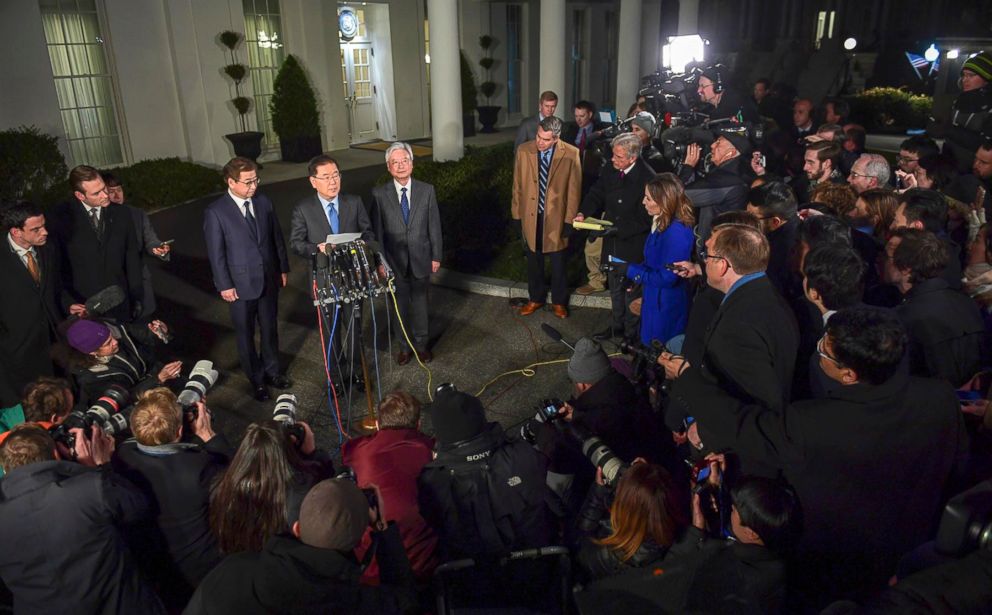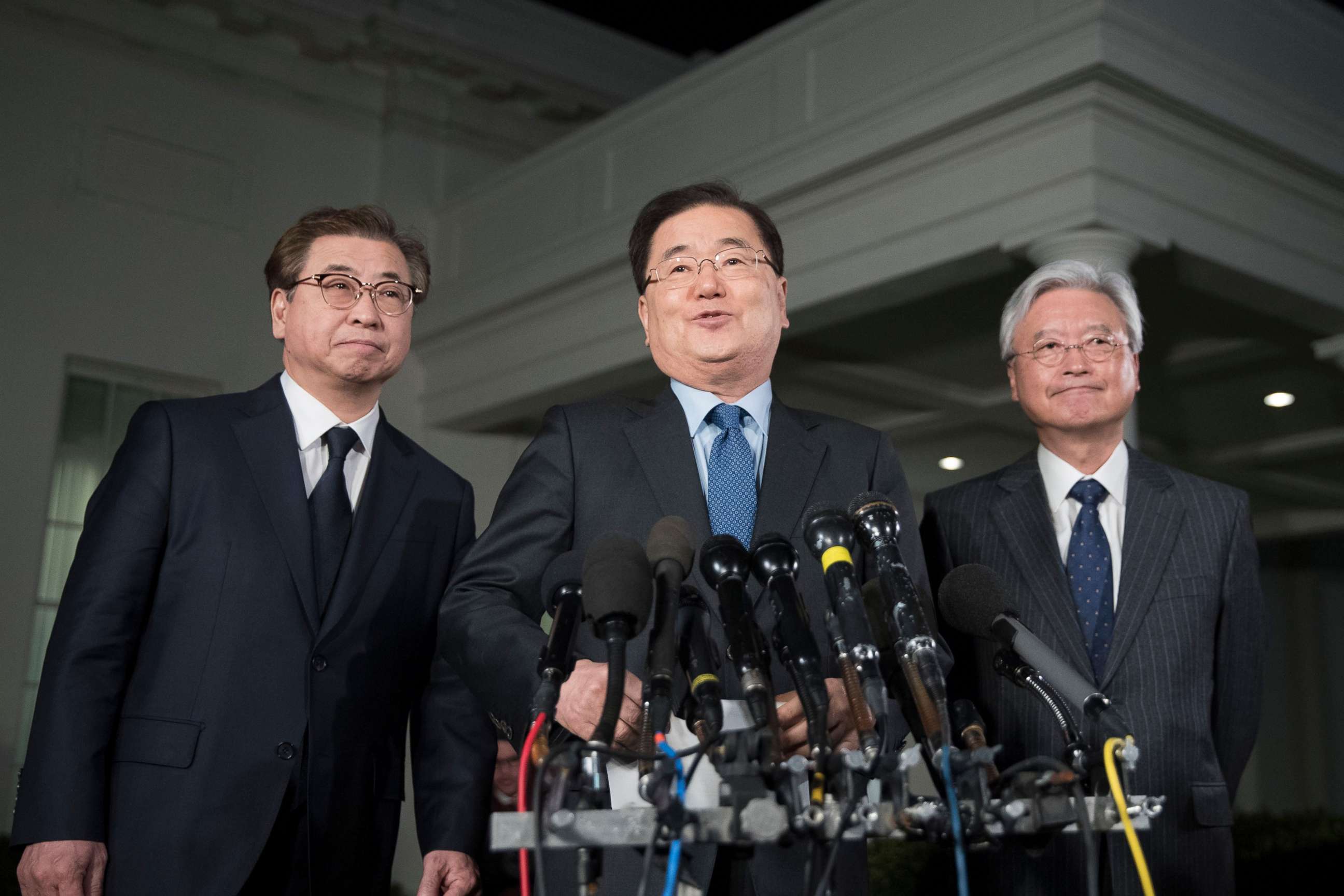Trump agrees to meet with North Korean leader Kim Jong Un on denuclearization
Dramatic announcement comes as South Korean officials visited the White House.
President Donald Trump has agreed to a high-stakes meeting with North Korean leader Kim Jong Un by this May on his nuclear weapons program, South Korea's national security adviser announced at the White House Thursday evening. He had briefed the president on a message from Kim earlier in the day.
The White House said afterward that Trump "will accept the invitation," and the president tweeted, "Great progress being made ..."
South Korea's envoy Chung Eui-Yong said that in his recent talks with Kim the North Korean leader had expressed an eagerness to meet with Trump as soon as possible.
Chung said that Kim told him he was committed to denuclearization, would refrain from any further nuclear or missile tests, and had agreed that U.S.-South Korean joint military exercises the North objects to must continue.
"I explained to President Trump that his leadership and his maximum pressure policy, together with international solidarity, brought us to this juncture. I expressed President Moon Jae-in’s personal gratitude for President Trump’s leadership," he said, referring to South Korea's president.
White House press secretary Sarah Sanders issued a statement shortly afterward from the U.S. side saying, "President Trump greatly appreciates the nice words of the South Korean delegation and President Moon. He will accept the invitation to meet with Kim Jong Un at a place and time to be determined. We look forward to the denuclearization of North Korea. In the meantime, all sanctions and maximum pressure must remain.”
Later Thursday evening, Trump tweeted: "Kim Jong Un talked about denuclearization with the South Korean Representatives, not just a freeze. Also, no missile testing by North Korea during this period of time. Great progress being made but sanctions will remain until an agreement is reached. Meeting being planned!"
Secretary of State Rex Tillerson, who spoke to reporters Friday in Djibouti while on a tour of several African countries, said, "President Trump has said for some time that he was open to talks and he would willingly meet with Kim Jong Un when conditions were right, the time was right. And I think in the president's judgment that time has arrived now."
A senior administration official told reporters the president deserves credit for the dramatic developments.
“I think that history speaks for itself," the official said, adding "as President Moon expressed, he believes that we’re at this juncture precisely because of the approach President Trump has taken with maximum pressure. President Trump has made his reputation on making deals and Kim Jong Un is the one person who is able to make decisions under their ... totalitarian system and so it makes sense to accept an invitation to meet with the one person who can actually make decisions instead of repeating this sort of long slog of the past.”
"At this point, we're not even talking about negotiations. What we're talking about is an invitation by the leader of North Korea to meet face-to-face with the president of the United States. The president has accepted that invitation," the official said.
The official said the president "has always left the door open to dialogue" at the right time, adding that the message from South Korea's national security adviser was conveyed orally to the president after Kim Jong Un conveyed the message to South Korea's national security adviser during their meetings.

"There was not a letter," the official said. "This was a message conveyed orally by Kim Jong Un to the national security advisor of South Korea during the several hours of meetings just a couple days ago in Pyongyang and Ambassador Chung, who is the national security advisor, then conveyed to the president today in the Oval Office."
"Part of that message was a commitment to denuclearize," the official said. "It was also a commitment to refrain from testing nuclear weapons or missiles and it was also an invitation. I would also add Kim Jong Un had made clear that he understands that routine defensive exercises between the Republic of Korea and United States must continue -- something that will continue and he conveyed that he wants to meet with President Trump as quickly as possible."
Kim joked about his own image to the world and said he did not take it seriously, the South Korean president's office told local reporters on Friday of the delegation's meeting with the leader in Pyongyang on Monday. An official from the president's office called Kim "honest and bold" and "very thoughtful" during the meeting.
"President Moon must have had a hard time early mornings to chair National Security Council meetings whenever we fired a missile," the president's office told local reporters on Friday, relaying Kim's words during the face-to-face meeting.
"I made a big decision today so President Moon won't have to wake up early hours anymore," Kim is quoted as saying, referring to the North's promise to not test missiles while the sides work on a summit.
South Korean presidential spokesman Kim Eui-Kyeom said in a briefing Friday afternoon in Seoul that a U.S.-North Korea summit meeting before May will be recorded as an historic milestone that will eventually lead to peace on the Korean peninsula.
"President Trump's leadership, which deliberately accepted Kim Jong Un's invitation, will be praised by the people of North and South Korea, as well as the people of the world yearning for peace," Moon said, as relayed by the spokesman.

Trump also spoke with Japanese Prime Minister Shinzo Abe to discuss the news, the official said.
"President Trump and Prime Minister Abe assessed that the maximum pressure policy, together with international solidarity, brought us to this critical juncture," the White House said in a statement discussing the call between the two leaders. "The leaders affirmed their strong intention to continue close trilateral coordination with South Korea to maintain pressure and enforce international sanctions until such point that North Korea takes tangible steps toward complete, verifiable, and irreversible denuclearization."
China's Ministry of Foreign Affairs spokesperson Geng Shuang told reporters at a daily press briefing on Friday that China "welcomes these positive signals by the U.S. and the DPRK." When asked if China would be open to hosting the Trump-Kim summit, Geng only responded, "China is a close neighbor and an important party to the issue."
The dramatic disclosure just outside the White House of a proposed meeting came after Trump told reporters Thursday afternoon to expect a major announcement from South Korea.
That word from the president came after a South Korean delegation met with top national security officials at the White House complex earlier in the day.
After Trump ducked into the White House briefing room to tease the announcement, ABC News' Jonathan Karl ran into Trump himself who told Karl the announcement was going to be a big deal.
"You should be there," Trump said. When Karl asked him whether the announcement was about possible talks with North Korea, Trump responded, "It's almost beyond that. Hopefully, you will give me credit."
The president was accompanied by Vice President Mike Pence.
According to an administration official, a "large delegation of United States government officials" were debriefed by a South Korean delegation.
Among the U.S. officials in the room, per this official, were National Security Adviser H.R. McMaster, Defense Secretary James Mattis, Deputy Secretary of State John Sullivan and Director of National Intelligence Dan Coats.
The officials said that after that meeting at the Eisenhower Executive Office Building, the so-called Blue House delegation accompanied by McMaster went to the Oval Office to debrief the president. At some point after that, the president decided to drop by the briefing room to tease an announcement.
ABC News' Hakyung Kate Lee and Joohee Cho contributed to this report from Seoul. ABC News' Karson Yiu contributed from Hong Kong.